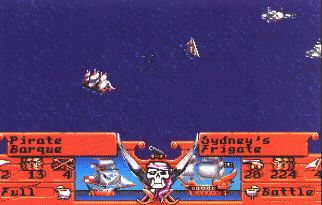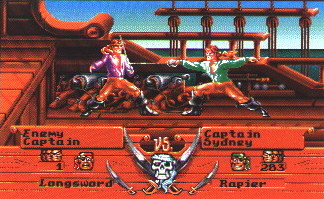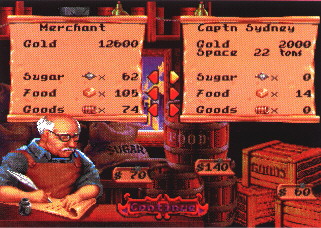


You can't afford to wait around in this game. The older you get, the worse a swordsman you become (at a frightening rate), so do all your personal combat early on if possible. (A hint: by 7 years of game time, you're too old to win at swordfights any more.) Your primary goals are the Ten Pirate Quests. Play on Apprentice level until you get the hang of things. I have no idea how you score any points on the higher difficulty levels; they're a real pain.
The Pirate Quests also involve a lot of personal combat, either directly or indirectly. For example, to find your relatives, you must fight evil Spaniards to get map fragments. To get the Silver Train or Treasure Fleet quests, you'll most likely have to sack towns.
Are the Pirate Quests important? Very. You can rack up more money and land than you know what to do with, get one of the "good" wives, and have titles of nobility with three nations, but if you don't get all 10 quests done, your score won't even reach 50 points at the end of the game, and likely it'll be lower.
If you're good enough, or have played the game for oh-too-many hours like I have ;) then you'll get to recognize many locations on maps purely by outline. The map fragments note reefs, swamps, landmasses, and towns and mountains. The latter two are hard to see on the maps, being in very pale colors, but towns are sort of greenish lintels and mountains are spartan lines.
In the character generation screen, you have a few options to work on (some of which I'll discuss below), but one is your chosen Skill. I recommend skill at Fencing or Medicine. Fencing means you're a better swordsman; Medicine means you'll keep your health going longer. None of the skills gives you an out-and-out advantage; you can still screw up in a swordfight even with Fencing skill. If you have the map that came with the game, you can find your way around pretty good, and ship combat is ridiculously easy, so I'd say forget the Navigation and Gunnery skills. Wit and Charm skill is useful only if you're going to be doing a whole lot of talking to people, like merchants, governors, and potential wives. You may need this skill if you want the "best" bride out there, who is nearly impossible to get under any circumstances. (She's the one with the cat.)
With some practice, you can learn the best angles to fire cannon at other ships. The easiest way is to fire broadside at them from a true vertical or horizontal position, but that could be difficult to get; most of the time you'll be firing at angles, and that just takes practice. The advantage to ship combat is that you can often get other ships to surrender without you having to enter personal combat. This is important as you get older.
The damage stages are Sail Damage, Lost a Mast, and Hull Leaking. Depending on the size of the ship, each one will take a certain number of hits. Pinnaces, for instance, can take maybe one hit each, especially if you're firing at them from a frigate or war galleon with its score of guns. When you're only promising or well known in reputation, you'll have to really beat other ships. If you get to be famous or notorious, sometimes you can get small ships to surrender after one shot.
There are a couple other ways to end a fight; one of the ships can run away (an entire screen must be between the two ships) or night can fall, ending the battle. (The ships drift apart in the night, presumably.) The latter happens if you take too long in combat, or if both ships have the same speed and one is trying to escape, etc.


If the town has no forts, you and your men just walk/sail in and start fighting. If the town has forts, you can attack by sea or by land. Some towns may only have one attack route -- if they take up a whole island or if they are far inland, for example.
Sea attacks vs. towns are straightforward; try to have a ship in sound condition, as the winds usually are poor. Sloops, barques and pinnaces are best for poor winds, but you can't carry many men in them, especially pinnaces. Only those men on the attacking ship will scale the walls of the town when you get close enough. If you try for a town with three or more forts -- and lots of cannon aimed at you -- you probably want to get in as fast as you can; if cannonballs sweep your decks, particularly in a small ship, the results can be devastating. On the other hand, you have the option (if you can maneuver well) of wheeling back and forth, trying to blast the town. In the end you will have to attack personally, however.
Being Spanish is a mixed bag. On the one hand, you're probably in good with the Spaniards, but unless you turn renegade and attack your own country's towns, you aren't likely to have much to do. This is especially true in both the early and late periods. In the early days, hardly any towns are non-Spanish, so you can't easily find places to repair ships, sell goods, and recruit troops. In the final days of the age of piracy, it isn't cost-effective for nations to pay for buccaneers, so your best bet is to become one of the Costa Garda looking for other pirates, which isn't much fun either. (How are you supposed to get the Treasure Fleet and Silver Train, for example, without attacking your own towns and ships?)
Being English and French are pretty much the same in many ways, although according to the game the English are a little easier to play. Either one is likely to be at war with Spain or each other at some point. The benefit here is that as time goes on, there's more English and French towns for you to use.
Being Dutch is, IMO, the most fun. There are only a few Dutch ports in the game (starting in 1620) but by 1640 they're downright wealthy, which means you can sell goods, hides and sugar there. Plus you can usually take over easy-mark towns for the Dutch crown and rake in the rewards; Holland has a habit of being at war with Spain fairly often. In one Amiga game I was able to turn almost the whole of the Caribbean into the "Dutch Main"! :)
The Dutch also have first crack at sloops, which I've already sung the praises of. If you're not Dutch, you'll probably have to capture them off a pirate or hope your country's at war with Holland so you can grab some. Sloops are common by 1660.
The worst time period for pirates in this game is "Merchants and Smugglers", 1600-1620. Practically nobody is at war. If you want to try surviving as a trader or merchant, it's an uphill battle. There isn't much to trade (goods and hides) and not many places to trade it to. Most of the other time periods are pretty good, with the 1660s being best; piracy is common and the chances for advancement are excellent. Learn the game in this time period before you try the others.
Another thing you can do is "double-dip" for rewards. For example, let's say I'm playing a Dutch pirate and Holland is at war with Spain. A few months later (in game time) France also declares war on Spain. I can then head to a French port and start claiming rewards for any victories over the Spaniards I can manage. The more titles and status you can rack up, the better your score at the end.
You can lose Letters of Marque by attacking "friendly" towns, but you can never lose any titles or land awarded by nations. So if I become a French Major and then begin attacking French towns, I never lose my title of Major or any land I was given by the French, although I certainly won't be welcome anymore. Always try to stay friendly with at least one nation, because it gets hard to do things if you can never get to port.
One last bit of advice on time periods: if nobody's at war when you start the game, and you want to make your living as a pirate rather than as a trader, it's not a good sign. If after 6 months to a year, nobody has declared war on anyone, you might as well restart the game and try again. The passage of time can really hurt you later on.

The next most important cargo item is food. You'll need lots of it, particularly if your manpower increases. Food is also pretty easy to come by on the high seas -- after cannon, it's the next most common thing to find.
The third item, and the one usually carrying the most profit, is the Important Trade Good of the time period. This may be tobacco, hides, or sugar. If you've got plenty of food, or few men, you might want to consider dumping extra food to take on sugar (but never dump cannon!). Sugar is usually worth a lot in its time periods. (It's made into rum.)
Last is "goods", which is in every time period. Goods are rarely worth anything, and can be easily dumped to make room for more important things like cannon, food, or sugar. Quite often food carries a higher price than goods do, once you get into a port. If you have extra room, and you pick up goods from a ship-capture or town-plundering, you might as well; if not, don't worry about them.
The best places to sell things are in wealthy ports, not just because you get the best prices, but also because they're likely to have money to buy things with! A poor town won't be able to afford much, leaving you going from town to town trying to unload your inventory. If the men are getting restless and you're having trouble with desertions, this can add up in a hurry. (When they desert, they take some of your money!)
Why does your pirate always wear a light pink or lavender coat? See?
What's up with the evil Spaniards? They wear the weirdest eye makeup and lipstick. It just looks wrong.
Return to the Psyko Drome Videogame Menu
This page created 19 Jul 1998
This page updated 19 Jul 1998